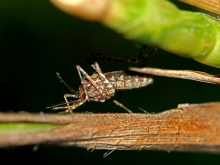Big data on ecology and evolution explored in new Centre for Doctoral Training

From genes and species to whole ecosystems or the global biosphere, students in a new PhD scheme will tackle nature's mathematical problems.
Imperial College London, together with the University of Reading and partners at the NERC Centre for Ecology and Hydrology, Cefas and the Zoological Society of London, have received funding for a new Centre for Doctoral Training in Quantitative and Modelling Skills in Ecology and Evolution (QMEE).
Centres for Doctoral Training are Research Council-funded centres addressing critical skills gaps in the UK research community, and the new Centre aims to train large cohort of PhD students who will push forward UK research in quantitative ecology and evolution. The Centre has received funding for 36 students over three cohorts.
Hayley Dunning talked to head of the new Centre at Imperial, Professor Timothy Barraclough, about why the Centre is needed and what its students will investigate.
What is quantitative research and why is it important for ecology and evolution?
 It is hard to predict how natural systems, such as forests or coral reefs, will respond to impacts such as climate change. It is even harder to manage natural ecosystems for benefits such as sustainable food production, clean water supplies, disease control, and conservation of endangered species.
It is hard to predict how natural systems, such as forests or coral reefs, will respond to impacts such as climate change. It is even harder to manage natural ecosystems for benefits such as sustainable food production, clean water supplies, disease control, and conservation of endangered species.
For example, how do animals, plants and microbes in a tropical forest respond to deforestation, oil-palm plantations, or a warming climate? How will those responses influence ecosystem services such as clean water supply, carbon balance, and the risk of vector-borne disease outbreaks? And how might they in turn feed back to change global phenomena such as climate change? We need to bring together theoretical models and new sources of ‘big data’ to be able to tackle these problems.
What skills will students gain in the programme?
The students will learn cutting-edge mathematical and computational skills, coupled with the broader team skills needed to tackle real-world problems.
In addition to their individual projects, a particularly novel feature is that they will work together in ‘tiger teams' - groups of diverse experts brought together to solve a specific problem - on projects led by a range of stakeholders in industry, government and charities.
For example, they might develop a new database or software for modelling and controlling the spread of invasive species or new computational methods to identify breeding bird territories from citizen science records sent via mobile phone apps.
How will the students benefit from multidisciplinary collaborations?
 As well as researchers in life and environmental sciences, QMEE brings together researchers across physics, mathematics, computing, medicine and engineering, with complementary skills and perspectives and for tackling ecological and evolutionary problems. Together with our partner institutions, the students will receive training in the full breadth of ecological and evolutionary concepts and data as well as necessary mathematical and computational techniques, with further opportunities to translate their research into policy and management.
As well as researchers in life and environmental sciences, QMEE brings together researchers across physics, mathematics, computing, medicine and engineering, with complementary skills and perspectives and for tackling ecological and evolutionary problems. Together with our partner institutions, the students will receive training in the full breadth of ecological and evolutionary concepts and data as well as necessary mathematical and computational techniques, with further opportunities to translate their research into policy and management.
Students will work closely with collaborative institutes within Imperial too, such as the Grantham Institute for Climate Change and the Environment and the Data Science Institute. Similarly the Institute for Environmental Analytics at the University of Reading will bring links to industrial partners and train students in translating their research into commercial solutions.
What do you hope the programme will achieve?
Our goal is to train quantitative scientists who tackle real-world problems in ecology and evolution by connecting theory, data and practice. Academic research often focuses on fundamental theory without making the link to solving applied problems of relevance to human populations. In turn, applied work on natural ecosystems often suffers from a dearth of applicable theory and quantitative methods.
We want to bridge this gap - in part because it is vital to solving key issues facing humanity and in part because that is where the greatest intellectual and scientific opportunities lie over the coming decades. By training a new generation of skilled researchers with the drive to tackle big environmental problems, we hope to bring about a culture change in the field.
Article supporters
Article text (excluding photos or graphics) © Imperial College London.
Photos and graphics subject to third party copyright used with permission or © Imperial College London.
Reporter
Hayley Dunning
Communications Division